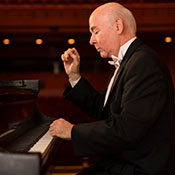
The many faces of Mozart: A Conversation with pianist Jeremy Denk
David Lewellen
PUBLISHED
Tagged Under: 2016.17 Season, Classics, piano, uest Artist
With many dates on his calendar committed to a recital that spans 400 years of music history, Jeremy Denk will land right in the middle when he performs this weekend with the Milwaukee Symphony.
The noted concert pianist, a regular visitor to the MSO, will perform Mozart’s Piano Concerto No. 19, a piece that he called “an opera full of voices, from tragic to comic to almost vaudevillian. It’s like an ecosystem of different Mozarts.”
That ecosystem also includes the orchestral voices, which Denk compared to “operatic personalities that shape it moment to moment. Mozart liked to treat the winds like operatic divas.” In preparing any Mozart concerto, he said, most of his time is spent studying the orchestral parts with which he collaborates. Sometimes, Denk even asks for the winds to be placed in the front row, where he can interact with them more closely.
The typical concertgoer may think of Mozart as the epitome of restrained, balanced, symmetrical music. But along with that, in this week’s piano concerto Denk hears “a crazy scientist in the lab experimenting with things, incredibly wicked, almost trying to tear apart” the conventions of the 18th century. It features virtuosic woodwind parts, a fugue that is “almost impossible to keep track of,” and “a sense of glee at what he’s able to do compositionally. It’s not just me onstage, but a crowd of different personalities.”
Denk’s performances of Mozart this spring, with Milwaukee and with other ensembles, are interspersed with a recital program that he debuted last summer, which stretches from the Renaissance to the forbiddingly avant-garde Conlon Nancarrow. “I love the centuries-long story of music history,” he said, “and how after each style dies, we have to invent a new language. And I want to tell it like an epic poem, in one night.”
As well as being an international concert pianist, Denk has also developed a reputation as a writer, beginning with his blog Think Denk, which has been inactive for several years. “That was for my own pleasure, and certainly no money,” he said wryly. “I don’t remember how I had time to do that.” Things changed when he got an email from The New Yorker, which eventually led to his well-received reflection in 2013 on teaching and lessons, “Every Good Boy Does Fine.”
Currently, Denk is at work on a memoir that expands on those ideas and also offers thoughts on music and composers. Music and writing are “both pretty neurotic and solitary,” Denk said, “but they exercise different muscles in the brain.” Often, he said, writing about a piece will clarify or change his approach when it is time to play it again.
And published writings, too, can affect how audiences hear his playing, or offer them another point of entry to experiencing a piece. By writing, “I hope I can draw people in, in a way that listening didn’t,” Denk said. The New Yorker’s Alex Ross called him “the liveliest writer-pianist since Glenn Gould,” and many composers also had a sideline as writers, but Denk has no interest in composing: “I don’t need a third job.”
Jeremy Denk will perform Mozart’s Piano Concerto No. 19 on Friday at 11:15 a.m. and Saturday at 8:00 p.m., with Karina Canellakis conducting. The program also includes Hymne au Saint Sacrement by Messiaen, Le Chausseur Maudit by Franck, and Beethoven’s Symphony No. 8.


